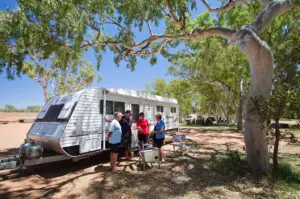LESSONS LEARNT FROM EXPERIENCE
Our free camping experts reveal 15 common mistakes and how you can avoid them
WRITTEN & COMPILED BY GRANT HANAN & LINDA BLOFFWITCH PHOTOGRAPHY BY GRANT HANAN, LINDA BLOFFWITCH
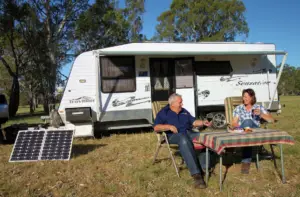
There is no doubt that free camping allows you to experience the best of what our country has to offer. But there is also a good chance that not every camping experience you’ve had has always gone according to plan. To help you avoid the blunders that even the most experienced free campers have made at some stage during their RV travels, we’ve compiled 15 common free camping mistakes with the assistance of some of our regular contributors.
RUNNING OUT OF GAS
If you’ve ever run out of gas when travelling, you will know how inconvenient it can be. Unlike other RV accessories that come with inbuilt gauges, the humble RV gas bottle generally has no such gauge or display.
Try using key tags with labels and dates on your bottles so you know which bottle is full or empty. Better still, pick up an electronic, batteryoperated handheld unit that displays the remaining gas level when held up to the bottle. Regularly marking the lowering gas level on the bottle with a pencil provides you with a good indication of gas consumption.
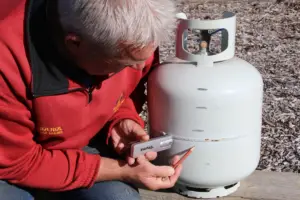
WATER LEVELS
Marg Mcalister
When free camping at Opal Creek in outback Queensland with friends, we made sure we filled the water tanks at a caravan park in Winton before we left. But somehow, the water level indicators didn’t seem to reflect the amount of water put in.
After a few days free camping, we again checked the water level indicator and found they were showing REALLY low levels, even though we’d been careful with water usage! Luckily we were camping with a caravan repairman, who soon spotted not one problem, but two: wasps had nested in both water inlet valves (hence when we thought the tanks were full, they weren’t!) and to make things worse, a water hose had split while travelling along rough roads. Good thing we had all brought extra water!
AWNING DAMAGE
It seemed a perfect spring day in outback NSW when we set up our caravan and rolled out the awning at a free camp in readiness to watch the footy Grand Final. We were engrossed in the game when an unexpected gust of wind grabbed our awning and flipped it over the caravan resulting in a large material tear, damaged arms, and some mild panel damage.
It was a costly exercise! Cheap, small pegs shouldn’t be in any free camper’s kit, and we’ve now replaced ours with multiple strong, high quality pegs that are placed at an angle to the pulling forces.
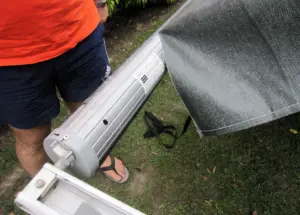
CAMPING UNDER TREES
When the mercury rises, it makes perfectly good sense to find a shady campsite. Some of the best free camps are located in, and around, native bushland and forests. Large trees as good as they are to camp under, don’t give you any warning whatsoever when they drop limbs, and it doesn’t just happen in windy weather. So you’re placing yourself and family at risk when camping directly underneath.
Avoid parking your RV or vehicle directly under overhanging tree branches and set up camp well away. Instead, travel with your own portable shade devices and use the shade from your RV to provide you with relief from the heat throughout the day.
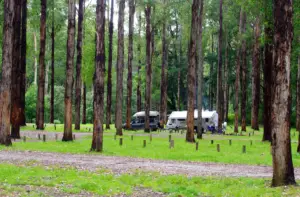
PICKING YOUR NEIGHBOURS
Bob & Phyllis Bowers
When we pulled into a free camp in Victoria’s Otway State Forest, we thought it was paradise. It had lush green grass, magnificent pine trees, a crystal clear babbling stream, and great camping spots. What we thought was a perfect camp turned out disastrous when later in the day, a group arrived following their Friday “after work session”. They weren’t only loud, but they cut down enough firewood with their chainsaw to last all Winter!
We ended up moving as far away as possible. So when parking nearby to towns, look for any tell-tale signs that the location could be the local party venue. Make sure you give yourself enough room to distance yourself from others, otherwise be prepared to pack up and move on a little further, if need be.
SECURITY CONSCIOUS
When you’ve been free camping for a while, it can be a little easy to take things for granted. We had accidentally overlooked locking our external storage box one night, and frustratingly found it empty the next morning. Bits and pieces of hose fittings and wheel chocks were strewn over the ground, but items such as our water hoses and power leads were all missing.
If you want to avoid being a thief’s next target, develop a routine that has you checking all of your items are locked away before retiring each night to your RV. The temptation for others to pick up and walk off with what’s yours can be too great. You just never know who you are camping with, or who passes by!
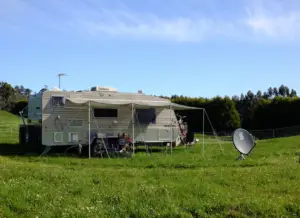
LEAVING RUBBISH OUT
Many of today’s free camps don’t provide rubbish bins, so you’re expected to take it with you when you move on. Leaving rubbish containing food scraps out overnight only encourages unwanted guests and you could be left to clean up a mess the next day.
It goes without saying that you shouldn’t leave rubbish out overnight, so what are you supposed to do with it? We’ve found a gear bag that zips closed and held in place over the spare wheel of your RV or vehicle is a great solution. The rubbish is secure, the smell remains outside the RV, and you’re doing your bit to keep the environment and free camp clean.
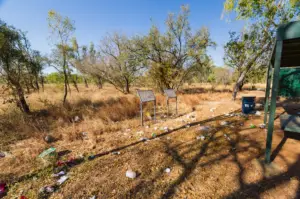
CAMPFIRES
When it comes to free camping, not everyone likes to have a campfire. So be careful when setting one up that you keep in mind how close you are to other people and which direction the wind is going. Not only could you disturb your neighbour’s free camping experience, but you could also end up with a van full of smoke.
If you’re not the campfire type, as straightforward as it seems, choose campsites that don’t permit fires, where possible. At the very least, specifically look for camps that have dedicated fire rings so you can choose how close you want to park within their vicinity.
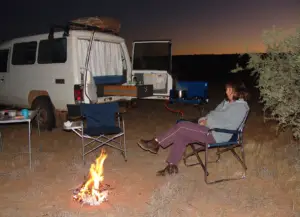
SOLAR OPTIMISATION
Lorraine Holloway
After two years on the road, we wondered why we weren’t getting optimum charge in our house batteries. Were the solar panels dirty? We hadn’t parked in the shade this time and there was sun almost all day. We decided to “follow the sun” one day, using household items to represent the caravan, air-con, solar panels and tow-bar.
By arranging the items in different positions, to track the sun and shadows, we found that if we pointed the van SW, we gained optimum sun on our solar panels, and any shade cast by our air-con did not affect us. Now when we pull into a camp site, we try to drive into the SW. Four years later it still doesn’t always work as sometimes the view is better the other way!
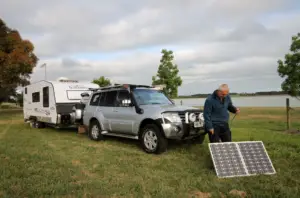
TOO LATE TO FIND A CAMP
There may be times when you’re travelling that you’ll keep driving until you’re ready to stop for the day. That may be fine in less travelled areas, but if you’re travelling on popular routes, that could be a big mistake as free camps can fill up quickly. You may struggle to find a welcoming campsite too late in the day, and when you do, it could be a roadside camp only metres from busy highway night traffic.
Aim to do some trip planning and calculate your distances and work out approximate travel times to avoid the above scenario. If you’re looking at a free camp as a long term stay, arrive early in the morning and wait for others to leave so you get the first pick of campsites.
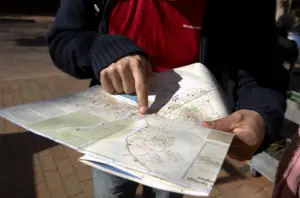
CLOTHES LINE
With water being a precious commodity when free camping, you don’t want to be washing clothes more than you need to. To help your clothes dry, many of us string up a washing line in nearby trees to catch the sun.
But when clothes don’t dry during the day, get into the habit of bringing them inside your RV overnight by setting up a makeshift clothes line. Not only does this avoid them being pulled down by intrigued wildlife, weather can easily change overnight. Your makeshift line can even remain in place while travelling, so there’s a good chance your clothes will be dry by the time you’ve reached your next destination.
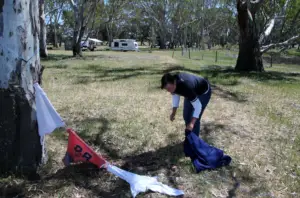
DRINKING WATER
We learnt early on that when travelling in some remote areas, you may have little choice but to accept and take on board, artesian bore water. But it wasn’t until filling our drinking water tank that we noticed the dedicated filter quickly blocked up, and worse still, the sealed unit couldn’t be washed out.
We now filter the water as it enters our on board tanks, and carry a spare filter cartridge for the sealed unit. If you’re not 100% sure of the quality of the water you’re taking on board, then try using smaller carrying vessels such as jerry cans – boil the water, and filter through portable jugs as required for drinking.
OVERLOOKING THE BASICS
Over time, even the most experienced RVers don’t always rely on their check sheets when it comes to day to day travel items. And if you’re like us, many of these items such as insect spray, sunscreen, first aid and torches remain in your RV even when you’re not travelling.
But you can guarantee that when you’re off the grid, that’s when good old complacency chalks one up for the team! How often have you found the insect spray is often near empty, the torch batteries have gone flat, and the first aid kit was never restocked with band aids?
We use the same philosophy for travelling as we do at home; when things are running low, it’s the user’s responsibility to add it to the shopping list before it completely runs out.
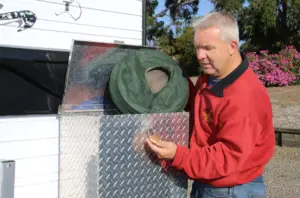
RIGHT PRODUCTS FOR THE JOB
Karyn Fanous
While camping in the very beautiful, but very dusty Karijini National Park, our caravan door became very difficult to open. I recalled my father using WD-40 to free up all manner of mechanical gadgets, so I assured my protesting husband that it would solve the problem of our sticky van door latch. Unfortunately, it caused our door to seize up even more!
Apparently, we should have used graphite powder on our door latch – never WD-40 as it attracts more dust! My husband gleefully said “I told you so” while we were having it repaired in Broome!
RUNNING OUT OF POWER
If you are like many free campers, your setup will have house batteries that supply lighting, run water pumps, and run your refrigerator. Battery recharging is normally undertaken by solar or perhaps a generator. However what happens if there isn’t enough sunlight to run your solar panels or enough fuel for your generator?
Aim to calculate your daily consumption rate so you know how long your battery capacity will last without being recharged. If you are faced with the dilemma of not having enough 12 volt power, have a backup plan for lighting, obtaining water, refrigeration and cooking.
